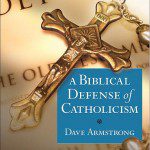
St. John, from the Coronation Gospels: late 8th century [public domain / Wikimedia Commons]
(5-8-02)
***
*
Truly, truly, I say to you, he who hears My word, and believes Him who sent Me, has eternal life, and does not come into judgment, but has passed out of death into life.
Notice John says the one who believes has eternal life and does not come into judgment (i.e. condemnation). It is believing alone that John mentions which takes one from death to life and guarantees that the believing one will not be condemned. This is no different than what St. Paul says in Romans 5:1
The word for “believe” is pisteuo (Strong’s #4100). It includes in its meaning obedience, not mere mental assent. Thus it is contrasted with disobedience (apitheo) in Jn 3:36, as if it were a synonym for obedience (cf. 1 Peter 2:7, using the same two Greek words). Thus, this would apply to classic evangelistic verses such as Jn 3:16, Rom 1:16, 4:24, 9:33, and 10:9. Kittel, in his Theological Dictionary of the NT (abridged, p. 854) states about this sense of pisteuo:
as ‘to obey.’ Heb. 11 stresses that to believe is to obey, as in the OT. Paul in Rom. 1:8; 1 Th 1:8 (cf. Rom. 15:18; 16:19) shows, too, that believing means obeying. He speaks about the obedience of faith in Rom. 1:5, and cf. 10:3; 2 Cor 9:13.
Therefore, since “believe” also contains an obligation of obedience and perseverance, those things aren’t excluded from Jesus’ remarks; therefore He didn’t intend His utterance to be understood as an indication of instant salvation and assurance of eternal life. This is the typical Hebrew drawing of strong contrasts as well. It doesn’t negate the place of good works. In fact, five verses later Jesus refers to the Judgment. And how does He speak about it?:
. . . those who exercised faith alone, to the resurrection of life, and those who did not rely on faith alone, to the resurrection of judgment. (Jn 5:29)
Well, not quite; this is the ESV, the Evangelical Standard Version, which is an unauthorized one. The verse actually reads in the RSV:
. . . those who have done good, to the resurrection of life, and those who have done evil, to the resurrection of judgment.
Jesus again needs a crash course at Campus Crusade or Inter-Varsity, in how to properly present the Gospel, so people can get saved. But they would probably turn Him away at the door.
Now, why do you think this changes the promises of Jesus in John 5:24?
It doesn’t “change” it; it has to be harmonized in an overall consistent Christian theology, to be correctly interpreted in the first place.
In Mt 7:21 Jesus states:
Not every one who says to me, ‘Lord, Lord,’ shall enter the kingdom of heaven, but he who does the will of my Father who is in heaven. (cf. Mt 5:20; 16:27; 25:31-46; Lk 18:18-25)
A similar idea occurs in 1 Jn 5:13:
. . . you who believe in the name of the Son of God, that you may know that you have eternal life.
But two verses later, he writes:
And if we know that he hears us in whatever we ask, we know that we have obtained the requests made of him.













